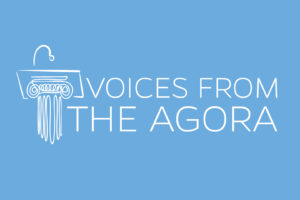
When Leah Hersh signed up for Intro to Civic Life, she wasn’t sure what to expect. As a computer science major, she had a quiet sense she’d been tuning things out. She didn’t follow the news or discuss politics much. She had opinions, but rarely said them out loud.
“I realized I was probably under-informed,” she said. “But it felt important to learn how to stay engaged. I wanted to figure out what that looked like for someone like me.”
At first, she thought civic engagement meant voting or going to a protest. An event that occurred during elections or in times of crisis. What surprised her was how much the course focused on conversation, curiosity, and building trust.
One moment that stuck came during a peaceful protest training. The instructor split the class into two groups and asked them to persuade someone across the room to switch places. “We immediately started arguing,” Leah said. “Then she told us, you could’ve just asked. We probably would’ve done it.”
“Two minutes later she said something I disagreed with,
and my brain shut off,” Leah said. “I forgot everything I’d just learned. You have to keep practicing this stuff.”
For her final project, Leah stepped outside her comfort zone. She interviewed a pro-Palestine student activist. The subject felt personal. “Because of my background, Israel-Palestine is something I have a strong, knee-jerk reaction to,” she said. “But that’s why I chose it.”
The interview wasn’t perfect. Leah explained she struggled to keep it focused and wasn’t sure how to go deeper. But the story her classmate told about a planned vigil, a university crackdown, and a legal challenge in federal court was new to her. “I hadn’t known any of that,” she said. “It gave me a lot to think about.”
The course changed how she thinks about disagreement. Before, she thought respect meant letting people have their own views. Now, it means staying in the conversation, letting someone’s concern shape your thinking, and listening for what you might be missing.
“I think if I really respect someone’s opinion,” she said, “then my own perspective should take in at least one or two things they said.”
She also appreciated how the class reframed the concept of pluralism. A reading by Rachel Kleinfeld taught her it’s not just about having different perspectives. It’s about what you do with them. You can separate, be silent, or talk. The course showed those as active choices.
Since then, Leah has talked more with family members who see things differently. She’s also found herself talking to strangers. Not about anything complicated. Just connecting. Just practicing.
Even as a computer science student, she feels more connected to civic life. “For a lot of students, it can be tempting to tune out, as if politics and political decisions won’t apply to us,” she said. “But it does. We all live in this society.”
She still worries. She sees how people’s faith in democracy can slip. But she also sees signs of resilience. “Things still mostly work,” she said. “There’s no reason we can’t rebound.”
What changed wasn’t her views; it was her willingness to talk, and to keep talking. “I’m having way more conversations now,” she said. “That’s the biggest difference. I see myself as part of more conversations.” She’s still practicing civic life, one conversation at a time.
